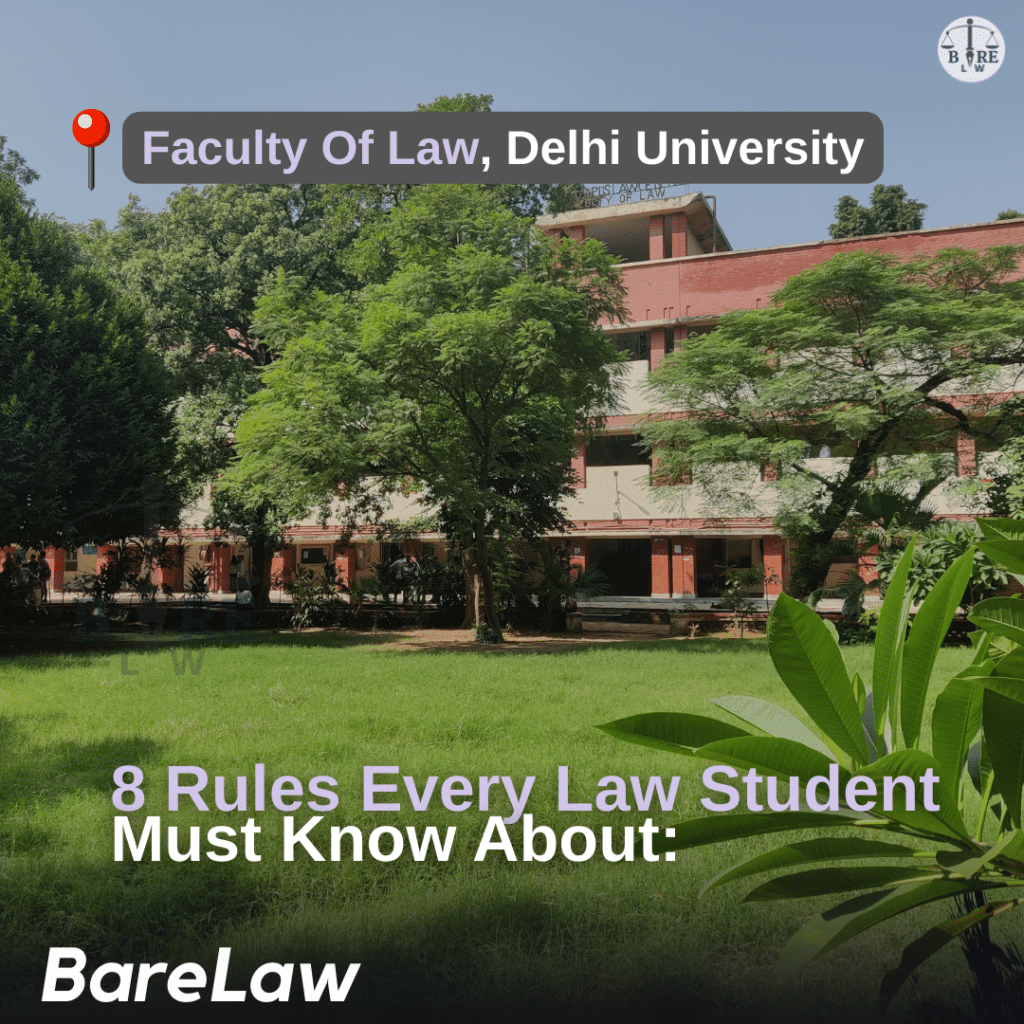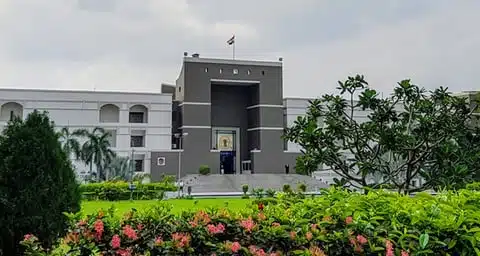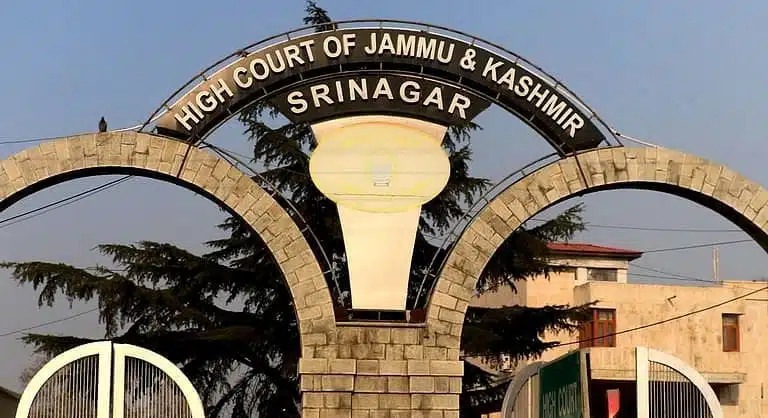This Article is based on the Important Rules given by Faulty of Law, Delhi University, on their website. The PDF is attached down below

8 Rules Every Law Student Must Know About Faculty Of Law, Delhi University
Table of Contents
So, those on the path to an LLB degree ( Law Students) at the College of Law, University of Delhi, need to properly understand all the college academic and administrative regulations to make their pace smooth and easy in the LLB course. The rules include attendance, promotion, re-admission, examination criteria, and other rules necessary to maintain academic rigour and discipline to the satisfaction of the University. The rules are laid out below, with the implications for students structured in all of them.
1. Attendance Rules
Academic integrity is central to attendance in the LL.B. program. The university mandates:
- Minimum Requirement: Before they are eligible to sit for examinations, students must attend at least 70 per cent of the lectures, tutorials, moot courts, and practical training in each course during each semester.
- Exceptional Circumstances: Attendance may be reduced to 65% for a particular course if overall attendance across the courses is 70% or above.
- Permitted Absences: Up to 15 days of absence per semester (maximum 20 days per academic year) may be relaxed by the Dean for:
- Legal aid camps recognized moot courts, seminars or internships.
- Situations are not foreseeable with valid documents.
- Consequences of Irregular Attendance: Students grossly irregular in attendance may be named for removal from the rolls.
2. Promotion Rules
The university ensures academic flexibility while maintaining quality standards:
- Automatic Promotion: Students in the First, Third or Fifth terms can continue to the next term without any restriction as to the number of courses failed by them, provided they are in attendance compliance.
- Promotion to Third and Fifth Terms:
- To progress to the Third Term, one must pass at least five papers combined from the First and Second terms.
- A minimum of 15 papers a year must be cleared from the First, Second, Third and Fourth terms combined to be promoted to a Fifth Term.
3. Re-admission Rules
Re-admission policies address situations where students are detained due to attendance or other issues:
- Prohibition on Re-admission to First Term: A student shall not be allowed to be re-admitted to any First Term under any circumstances.
- Conditions for Re-admission to Other Terms:
- Applications are due at least one term before the commencement of teaching in that term.
- Applicants need to have satisfactory conduct and good reasons for not being in attendance in the past.
- Foreign Students: Foreign students under cultural scholarship schemes are exceptions.
4. Examination and Pass Requirements
The LL.B. course evaluates students on academic excellence and diligence:
- Passing Criteria:
- A minimum of 45% marks is required in each paper.
- Students must pass all 30 courses across six terms to obtain the LL.B. degree.
- Result Classification:
- First Division: 60% or more aggregate marks.
- Second Division: 50%-59% aggregate marks.
- No division is awarded for aggregate marks below 50%.
- Distinction in Papers: Students who achieve 75% marks in a paper and pass all term papers in a single attempt are awarded a distinction.
5. Improvement of Previous Performance
Students seeking to improve their results can do so under specific conditions:
- Eligibility: Students may surrender results of specific subjects if they pass them on their first attempt and meet certain paper-passing thresholds.
- Term-specific Rules: Improvements must be undertaken in alignment with the term the subject belongs to, within the latest syllabus.
6. Supplementary Examinations
Students who fail to clear certain papers can take supplementary examinations:
- Timing: These fifth and sixth-term exams are taken simultaneously as regular fifth and sixth-term exams.
- Span Period: Six years from the admission date are needed to clear all 30 courses.
7. Restrictions on Simultaneous Courses
To ensure focus and integrity in the legal curriculum:
- Prohibition: During LL.B., the students are prohibited from attending any other full-time professional courses like Chartered Accountancy. Entailment may result in cancellation of the admission or the degree withdrawal.
8. Important General Instructions
- Accuracy in Documentation: Misinformation in admission forms may lead to consequences such as cancellations and even prosecution.
- Communication: Results and notifications will be available only on the university website or the Faculty of Law notice board.
- Finality of Admissions: Admissions will never be reopened once they are closed after seat allocation.
Proposed reforms for the faculty of law
The Faculty of Law, Delhi University, has devised a complete set of good conduct rules that it has made compulsory for its LL.B. students to follow. Although these regulations are thorough, they could also be enriched to match the changing educational standards and practices.
1. Attendance Monitoring and Compliance
- Current Practice: The institution requires a minimum of 70 per cent attendance in each course and provisions for relaxation in special cases.
- Potential Enhancement: Implementing a biometric attendance system can also help solve problems and ensure accurate tracking without discrepancies. As per recent directives by the Bar Council of India (BCI), law students have been asked to follow biometric attendance to increase compliance and transparency in the law mooting system.
2. Criminal Background Checks
- Current Practice: No procedures for conducting criminal background checks on prospective students are defined by existing rules.
- Potential Enhancement: Rather than letting the officers sift through the mounds of petty criminal paperwork, friends pester politicians and lawyers for background checks that can only help to uphold the integrity of the legal profession. This is consistent with BCI’s other recent reforms intended to ensure more integrity and compliance of legal education centers in India.
3. Integration of Legal Ethics and Professional Conduct Training
- Current Practice: Although the curriculum covers several legal subjects, it does not name any courses in legal ethics and professional conduct.
- Potential Enhancement: Mandatory legal ethics or professional conduct courses can better prepare students for the ethical difficulties of legal practice. It fits the BCI’s drive to introduce ethical principles into legal education.
4. Use of Technology in Legal Education
- Current Practice: The institution’s rules do not depict technology integration in teaching methodologies.
- Potential Enhancement: Utilizing digital platforms for lectures, assessment, and legal research can improve learning experiences and meet global trends in the field of education.
5. Continuous Curriculum Review
- Current Practice: There is no defined frequency of updating the curriculum, and its procedure is unclear.
- Potential Enhancement: A structured mechanism for the regular and consistent curriculum review can be set up with feedback from students, faculty, and legal professionals to ensure the education remains relevant and present.
6. Emphasis on Practical Training
- Current Practice: While moot courts and practical training are part of the program, the degree to which, and the depth to which, however is not specified.
- Potential Enhancement: Expanding the practical training repertoire, e.g., internships, legal aid clinics, and simulation exercises, will allow students to hone their hands-on skills and prepare them for legal challenges in the real world.
Based on these enhancements, the Faculty of Law at Delhi University can develop the LL.B. program not just to match but to exceed current educational standards and equip students for the future legal environment.
Supreme Court Censures Uttarakhand CM Over Rajaji Tiger Reserve Appointment
Supreme Court Censures Uttarakhand CM Over Rajaji Tiger Reserve Appointment Supreme Court Censures Uttarakhand CM Over Rajaji Tiger Reserve Appointment…
Gujarat High Court Criticizes State for Delayed Appeal Filing After 5 Years
Gujarat High Court Criticizes State for Delayed Appeal Filing After 5 Years Gujarat High Court Criticizes State for Delayed Appeal…
Jammu & Kashmir High Court Slams The Hindu for Removing Roster System Article
Jammu & Kashmir High Court Slams The Hindu for Removing Roster System Article Jammu & Kashmir High Court Slams The…
Taj Hotels’ Trademark: Delhi HC Fines Man for Infringing Taj Hotels’ Trademark
Taj Hotels’ Trademark: Delhi HC Fines Man for Infringing Taj Hotels’ Trademark Taj Hotels’ Trademark: Delhi HC Fines Man for…







